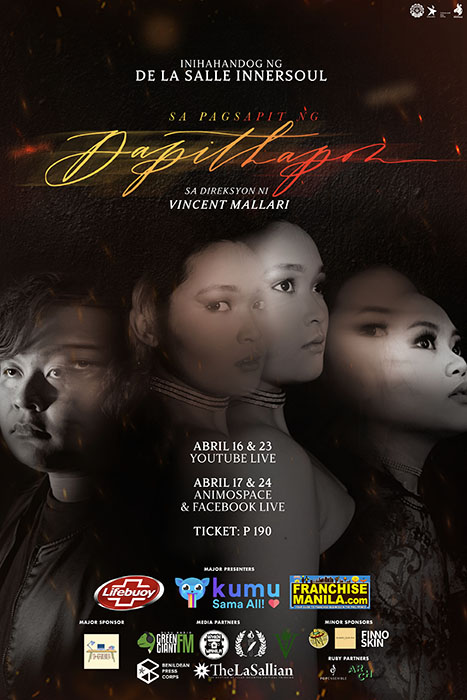By Gabriel John L. Adamos, Darius Miguel A. Matibag, Ysabella Natassia Maria S. Valerio
Music is a universal form of expression that allows emotions to convey what words alone cannot describe. The pandemic and the rise of the new normal changed how we enjoy music with friends and loved ones, but that did not stop De La Salle Innersoul from touching lives and moving hearts through song.
De La Salle Innersoul (DLS-Innersoul) is the premier vocal group of De La Salle University recognized and supported by the university’s Culture and Arts Office (CAO). In commemoration of their 24th anniversary, they staged their first online major production entitled Dapithapon. The show was held online via YouTube Live on April 16 and 23, via Facebook Live and AnimoSpace (De La Salle University’s Learning Management System) on April 17, and via AnimoSpace on April 24.
The concert was directed by Mr. Vincent Mallari, in cooperation with DLSU’s Culture and Arts Office. Produced by the members of DLS-Innersoul, the shift from stage to screen demonstrated the member’s talents as student artists. Through a series of cinematic narratives and original musical arrangements, the members had a story to tell.
Following a narrative that is set in the new normal, the show’s cast was introduced with their thrilling rendition of Billy Joel’s “We Didn’t Start the Fire.” Sampaguita’s powerful “Nosi Balasi” followed the number, captivating the audience with the performer’s formidable voices. The “Dahan Dahan Medley,” comprised of Rivermaya’s “Umaaraw, Umuulan” and IV of Spades’ “Bata, Dahan Dahan,” gave listeners a sense of both nostalgia and modernity, with both songs having contrasting tones but a similar message of the struggles faced by both performers and audience. Following this, the “Better Than I Medley” and “Sa Ugoy ng Duyan” expressed that there is always hope that shines through, albeit with overwhelming emotions amidst the hardships and struggles.
The group then performed the “Magkakabalikan Medley,” that centered heavily on love and relationships, while Panic! At The Disco’s “High Hopes” manifests everyone’s hopeful wishes for whatever is to come after the uncertainties brought by the pandemic. The group’s Executive Board also performed an original song, written by Ms. Franz Louise Santos, composed by Ms. Santos and Mr. Mallari, and arranged by Mr. Mallari, titled “Bibitiw”. Up next, the girls of DLS-Innersoul performed the “Dance Medley,” featuring artists like Dua Lipa and Little Mix, among others. Keeping the upbeat vibe, the group also performed “Some Nights” by Fun, further captivating their online audiences to dance and sing along with them.
The concert ultimately ended with Michael Bolton’s “Love is A Wonderful Thing,” with performance highlights from guest performers hailing from the different groups of the Cultural Arts Office of the university. The featured groups included the Lasallian Youth Orchestra, LSDC-Street, LSDC-Contemporary, LSDC-Folk, DLSU Harlequin Theatre Guild, and DLSU Chorale. The coming together of the student artists of CAO expressed the release of many emotions held in during this pandemic. A new day has certainly come where the warmth of music and art fills the empty space of one’s comfort.
The success of DLS-Innersoul’s concert is accredited to their hard work behind the scenes. The group consistently posted content, such as stills and portraits of the cast, to promote their concert. The group also collaborated with different organizations within and outside the university and reached out to numerous partners and sponsors. Aside from being performers, the members had several other tasks to carry out . Some were audio and video editors and all had to be their very own crew for grooming, styling, audio recording, and filming. . Along with the time management of academics and personal commitments, all efforts played a significant role in the success of their concert.
The limitations caused by the pandemic hindered the familiar feeling of togetherness. This health crisis did not only put a halt to jobs, education, and leisure but also to many other things that “could have been.” The battles everyone faces alone seem to become more difficult by the day. De La Salle Innersoul’s Dapithapon showed that anything is possible amidst the hardships and challenges when done together, even when physically apart.
Dapithapon narrates the story of the rise of new beginnings and the light after the darkness. The time invested pointed towards one purpose: to showcase that art and music is space for people to find relief, solace, and healing. Through music, De La Salle Innersoul has brought out feelings of anger, fear, longing, love, faith, and hope, connecting with their audience and with each other one song at a time. Even as the sun sets and the darkest night falls, there is hope in expectation of a new day to come. The sun will rise once again — nang sumapit ang dapithapon.





